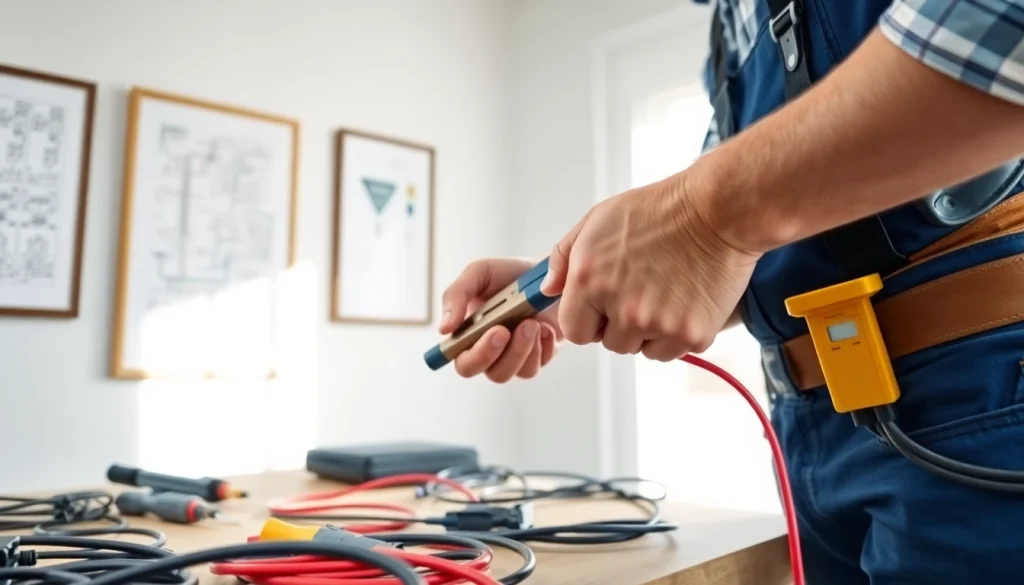
Understanding the Basics of Electrical Panel Upgrade
When it comes to home electrical systems, understanding the intricacies of your electrical panel can significantly impact your safety and comfort. An Electrical Panel Upgrade may be an essential step to ensuring that your home meets current energy demands while promoting safety. In this comprehensive guide, we will delve into what an electrical panel is, the reasons you might need an upgrade, and the key signs that your panel requires immediate attention.
What Is an Electrical Panel?
An electrical panel, often referred to as a breaker box, is a crucial component in any residential or commercial building. It serves as the distribution point for electrical circuits throughout the premises, housing circuit breakers or fuses that protect electrical circuits from overload and short circuits. By controlling the flow of electricity, this panel plays a vital role in your property’s safety and functionality.
Reasons for Electrical Panel Upgrade
Numerous factors can necessitate an electrical panel upgrade, primarily rooted in the need for enhanced electrical capacity and safety. As technology evolves and our dependence on electrical appliances grows, older panels may struggle to support modern demands. Upgrading your panel can lead to increased efficiency and reliability, making it an important consideration for homeowners.
Signs You Need an Upgrade
Recognizing the signs that your electrical panel needs an upgrade is crucial for maintaining a safe electrical system. Here are some indicators:
- Frequent Tripping of Breakers: If you are constantly resetting your breaker, it may indicate that your electrical system is overwhelmed.
- Old Breaker Box: If your panel is over 20 years old, it might not comply with current safety regulations.
- Blown Fuses: Regular blown fuses indicate that your system cannot handle the electrical load.
- Burning Smell or Discoloration: Any burning smell or discoloration on or near your panel is a red flag that requires prompt attention.
- Planning Major Renovations: If you are adding major appliances or undergoing renovations, upgrading your panel is often necessary.
Benefits of Upgrading Your Electrical Panel
Upgrading your electrical panel comes with a myriad of benefits that can improve both your home’s functionality and value. Understanding these advantages can help motivate a timely upgrade.
Improved Electrical Capacity
One of the most significant advantages of upgrading your electrical panel is the increased electrical capacity. Modern homes typically require more amperage than older homes were designed for. Upgrading from a 100-amp to a 200-amp service can accommodate additional circuits, making it easier to power appliances, computers, and other electrical devices without fear of overload.
Enhanced Safety Standards
Modern electrical panels are designed to meet stringent safety standards. Upgrading your panel can help eliminate hazards associated with outdated systems, such as electrical fires due to faulty wiring or overloaded circuits. A newer panel will also comply with the latest National Electrical Code (NEC) regulations, ensuring that your home is both safe and efficient.
Increased Property Value
Investing in a new electrical panel can raise your property’s market value. Prospective buyers are often willing to pay a premium for homes with upgraded electrical systems, as it reflects ongoing maintenance and safety consciousness. A modern panel minimizes future electrical issues, making your home more attractive in a competitive real estate market.
Cost Considerations for Electrical Panel Upgrade
The decision to upgrade your electrical panel often comes down to cost considerations. Understanding the potential expenses involved can help you plan accordingly.
Average Cost Range
The cost to upgrade an electrical panel typically ranges from $800 to $4,000, depending on various factors such as the type of panel and the complexity of the installation. Many homeowners experience average costs between $1,300 and $3,000 when upgrading from a 100-amp to a 200-amp panel.
Factors Influencing Costs
The final price of your electrical panel upgrade can vary based on several factors:
- Location: The cost of labor and materials can differ significantly from one region to another.
- Scope of Work: Additional work such as rewiring or changing breakers can increase the overall cost.
- Panel Brand and Type: Premium brands may involve higher upfront costs but often provide better longevity and features.
- Permits and Inspections: Some local laws may require permits and inspections, adding to the overall cost.
Possible Rebates and Incentives
Before opting for an upgrade, it’s worth investigating available rebates and incentives. Many utility companies offer programs that provide financial support to homeowners upgrading their electrical systems, especially for energy-efficient upgrades. The Charge Ready Home program, for example, offers rebates for households installing electrical panels to support electric vehicle (EV) chargers. Furthermore, federal tax credits may also be available for certain upgrades, reducing out-of-pocket expenses for homeowners.
How to Prepare for an Electrical Panel Upgrade
Preparing for an electrical panel upgrade involves several critical steps that ensure a smooth transition to your new system, which can help avert potential complications.
Evaluating Your Current System
The first step in the preparation process is to conduct a thorough evaluation of your current electrical system. Check the age and capacity of your existing panel and take note of any recurring issues—such as frequent tripping or blown fuses. This assessment will provide valuable insight into what needs are most pertinent and help your electrician recommend the best upgrade options.
Choosing a Qualified Electrician
Choosing the right electrician is paramount to a successful upgrade. Look for licensed professionals with extensive experience in electrical work. Ask for references and read reviews to ensure you’re hiring someone with a solid reputation. A qualified electrician will help navigate the requirements for your local area and ensure that your upgrade complies with all necessary codes and regulations.
Understanding Permits and Regulations
Upgrading an electrical panel typically requires obtaining proper permits to comply with local building codes. Your electrician can assist you with this process. Ensure that all work performed includes a final inspection by your local building inspector to verify that the installation meets safety standards.
Post-Upgrade Considerations
After upgrading your electrical panel, there are several considerations to keep in mind to maximize your new investment and maintain safety.
Maintenance of Your New Panel
Just as with any mechanical system, your electrical panel requires regular inspection and maintenance to ensure optimal performance. Periodically check for signs of wear, overheating, or corrosion. If you notice any issues, consult with your electrician to resolve them promptly. Maintaining a clean and functioning panel can extend its lifespan and prevent unexpected problems.
Future-Proofing Your Electrical System
Future-proofing your electrical system during your upgrade can save you headaches down the line. Consider your household’s projected electrical needs, like new appliances or home automation systems, and opt for a panel that accommodates growth. Installing additional circuits now can prevent the need for another costly upgrade in the future.
When to Schedule Upgrades Again
Finally, understanding when to schedule future upgrades will depend on the advancements in technology and changes in your household’s electrical needs. Regular reviews of your system every few years can help you anticipate necessary upgrades before a significant issue arises.
In conclusion, an electrical panel upgrade is not just a matter of convenience but a crucial step toward ensuring safety, efficiency, and property value. By staying informed and proactive in managing your electrical system, you can enjoy a safer and more capable home environment.






